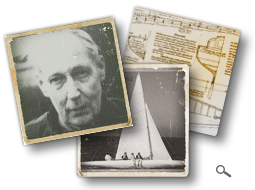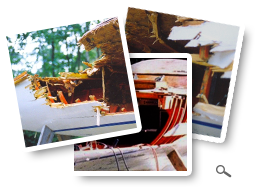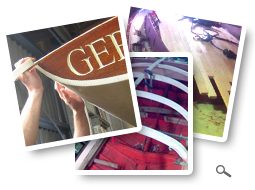GERD VI – the fastest 30 sqm ever

From the GERD to the GERD VI
Already at the age of 15 years, Harry Becker began designing 30 m2 skerry cruisers.
It has been assumed that Becker had fallen head over heels in love with a girl named Gerd (a common female name in Scandinavian countries) – and therefore he immortalised this name when naming his boats.
 In the year 1920, Becker designed his first 30 m2 skerry cruiser, namely the GERD. This boat was so successful at regattas that its successor, GERD II, was already constructed in the following year. Up through 1925, there were in total five skerry cruisers bearing the name GERD.
In the year 1920, Becker designed his first 30 m2 skerry cruiser, namely the GERD. This boat was so successful at regattas that its successor, GERD II, was already constructed in the following year. Up through 1925, there were in total five skerry cruisers bearing the name GERD.
Each of these boats prove to be unbeatable in the year in which they were built – and each was only surpassed in the next year by its respective successor.
Becker’s boats were – as were other boats by other designers in this era – becoming ever narrower in beam and longer.
In the year 1925, the skerry cruiser committee adopted new rules, and the so-called suitcase rule was introduced. The new regulations led to boats becoming broader and to higher freeboards.
Harry Becker also succeeded in obtaining a special permit: he was allowed (as the very last designer) to once again build a 30 square metre skerry cruiser according to the rules of the 1920’s. In 1927 – at the peak of Becker’s competence – this resulted in the most extreme thirty metre ever: the GERD.
The accident
In the year 1990, the GERD was owned by Christian Schörner. As with the previous owner, he no longer used the boat as a regatta boat.
 On the afternoon of June 25th 1991, Mr. Schörner was underway with his family on the Ingarö fjord when he suddenly noticed a motorboat headed on a collision course. Due to the low level of wind, the GERD was at this moment nearly incapable of manoeuvring. Mr. Schörner and his family attempted to sound the alarm by loud yelling and arm-waving - all in vain. Seconds later, the motorboat slammed full speed on the foredeck.
On the afternoon of June 25th 1991, Mr. Schörner was underway with his family on the Ingarö fjord when he suddenly noticed a motorboat headed on a collision course. Due to the low level of wind, the GERD was at this moment nearly incapable of manoeuvring. Mr. Schörner and his family attempted to sound the alarm by loud yelling and arm-waving - all in vain. Seconds later, the motorboat slammed full speed on the foredeck.
The GERD was about to sink – however, in the last minute Mr. Schörner managed to temporarily stem the leakage by plugging the hole with a sail. The GERD could then be towed into a harbour. It appeared to the owner that a restoration after such an accident was inconceivable – and thus began a “sleeping beauty” hibernation of many years for the GERD. Blocked up by trestles in a hall, the boat waited for a decision regarding its future.
A new beginning
 In the year 1994, Christian Schörner finally decided to pass the boat on to shipbuilding student Kasper Enge. Kasper Enge was not required to pay for the boat, however, he had to make a promise: that he would restore the GERD.
In the year 1994, Christian Schörner finally decided to pass the boat on to shipbuilding student Kasper Enge. Kasper Enge was not required to pay for the boat, however, he had to make a promise: that he would restore the GERD.
1927 to 2011: The GERD owners
| Year | Owner |
|---|---|
| 1927 to 1930 | Harry Becker |
| 1930 to 1943 | D. Lundin |
| 1943 to 1946 | Walter Gustafsson |
| 1946 to 1961 | Öhmann |
| 1962 up to … | J. Ström |
| … up to 1977 | unknown |
| 1977 to 1989 | Bengt Fransen |
| 1989 to 1990 | unknown |
| 1990 to 1995 | Christian Schörner |
| 1995 to 2007 | Kasper Enge |
| since 2008: | Thomas Behrend |
